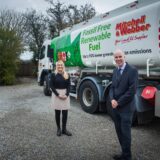
Euglena and PETRONAS partner on microalgae biofuel technology
Euglena Co. Ltd., based in Tokyo, Japan, has signed a comprehensive joint research agreement with Malaysia’s PETRONAS Research Sdn. Bhd. to develop large-scale production technology for microalgae, which will serve as a sustainable raw material for biofuels such as sustainable aviation fuel (SAF) and next-generation biodiesel, such as renewable diesel or hydrotreated vegetable oil (HVO).
This partnership marks a significant step in the global push towards cleaner energy, as both companies aim to harness microalgae’s potential to revolutionise the biofuel industry. PETRONAS Research, a subsidiary of the Malaysian energy giant Petroliam Nasional Berhad (PETRONAS), will work closely with Euglena on key processes such as algae cultivation, oil extraction, and the utilisation of by-products like defatted algae.
Defatted algae refers to algae biomass from which the oil or lipid content has been extracted. This extraction process is usually performed to obtain oils for various applications, such as biofuel production (e.g., biodiesel), nutraceuticals, and cosmetics. Once the oil is removed, the remaining biomass, known as defatted algae, still contains valuable components like proteins, carbohydrates, and other bioactive compounds.
The research is part of a broader project to establish a commercial biofuel production plant, which Euglena, PETRONAS, and Enilive SpA finalised in July 2024. The plant, expected to start operations in the second half of 2028, will process approximately 650,000 tons of feedstock annually, producing SAF, HVO, and bio-naphtha. Construction of the plant is scheduled to begin in the fourth quarter of 2024.
The plant is planned to be constructed within PETRONAS’ oil and petrochemical complex, Pengerang Integrated Complex (PIC), located in Johor, Malaysia. The partners will establish a joint venture in Malaysia, with PETRONAS Mobility Lestari Sdn Bhd (PMLSB), a subsidiary of PETRONAS, and Enilive as the largest shareholders, to construct and operate the commercial plant.
The planned feedstocks will be waste and residue-based materials such as used vegetable oil, animal fats and oils, waste from vegetable oil processing, and in the future, biomass materials such as algae oil derived from microalgae.





.jpg)






